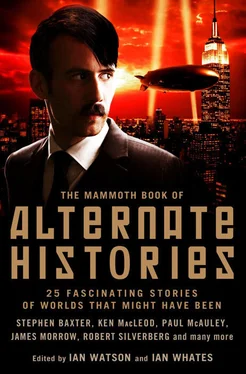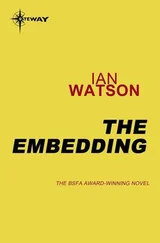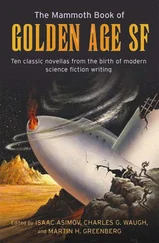“Remove your bonnet,” I said. “It’s not customary here. Your dress will pass. Go to that building, ask for the Women’s Institute, and say that you have just arrived from London, penniless. Say nothing of where you really come from, lest you be consigned to a lunatic asylum. You will be made welcome, and given employment. Learn what you can in this world, and as soon as possible I’ll take you back to yours.”
“But — “
Out of the corner of my eye, I saw my pursuer emerge from the pub called The Last Drop, and peer around.
“Goodbye, Miss Dykes,” I said.
I handed her the oranges — they were for here, after all, where they were scarce — and sidestepped as far as I’d ever dared in a single jump.
And fell briefly into a world of Latin buzz and blazing neon, of fairy lights suspended on nothing above a grassy park, on which robe-clad dark-skinned people strolled beneath a Rock with no Castle, and with an evening sky alight with the artificial constellations of celestial cities in orbit overhead. I sprinted across the sward, towards where the King’s Stables Road wouldn’t be. I’d never been in this probability, but I recognized it by report: this is the one where Spartacus won, slavery fell, capitalism rose, and the Romans reached the Moon in about 500 (Not) AD and Alpha Centauri a century or two later.
I leaped a stream that in most other worlds had long since been a sewer, sidestepped in mid-air, in a familiar but much less hopeful direction, and came down with a skid and a thud on dust and ash. I stumbled, flailing, and trod on a circle of glowing embers which I as quickly jumped out of, scattering more ash.
“Oi!” someone shouted. It must have been his fire.
“Sorry!” over my shoulder. Then I ran without looking back. Around me the early evening was lit only by scattered small fires, some of them behind the window-spaces of what buildings remained standing. Grass and weeds poked through the crazed tarmac under my feet. A few metres in front of me, a random leaf of grass or scrap of paper caught fire. I threw myself forward, hitting the ground with a pain I wouldn’t feel for minutes. I sidestepped into an adjacent probability, as one might roll on the ground, got up and ran on.
The Improver base in this Edinburgh lies beneath where a multi-storey park had been, close to the unaltered Castle Rock. I reached the door — saw a red bead on the wall — flinched aside — keyed the code in the lock — dived through.
I stood up in low fluorescent lighting, pale corridors. I suspected my pursuer would be after me. I rang the alarm. Two guards were ready for him when he slipped into our space from a probability where the car park’s floors hadn’t pancaked in the blast from Rosyth. His capture took only a moment: a hiss of gas, a thrown net, the laser pistol knocked from his fingers.
The guards tied him in the net to a chair. I tried to interrogate him, before the effects of the gas wore off and he gathered his wits enough to sidestep.
“Why are you after me?”
His head jerked, his eyes rolled, his tongue lolled. “Isn’t it obvious? You were on a mission to undermine the GBR!”
“What’s that to you?” I said. “To Conservers, that regime must be an abomination anyway — radical, revolutionary even — isn’t that everything you’re against?”
“No, no.” He struggled to focus his eyes and control his drool. “It’s a rare marvel. A socialist state that works, that has survived the fall of Communism, because of the computerized planning developed at Strathclyde from the ideas of Kantorovich and Neurath. You have no idea, do you, where that might lead? Nor do we, but we want to find out.”
“Well,” I said, “sorry about that, old boy, very interesting no doubt, but I’m fucked if my relatives will suffer in this Caledonian Cuba a second longer than they have to.”
He inhaled snot. “Fuck you.”
I could see I wouldn’t get much more out of him, so I whiled the minutes before he recovered enough to slip away by taunting him with what I’d done on the train. He looked at me with horror and loathing.
“You introduced Darwin to that world?”
“Who?” I said. “Wallace’s theory of natural selection — that’s what I outlined.”
He thrashed in the net. “Whoever. You know what you may have done, if that young woman should be the one who convinces that world that evolution happened? Some day, perhaps many years hence, in some backwater of an Eastern empire, a young man — an Orthodox seminarian in Georgia, perhaps — will read her work, lose his faith, and go on to lead a bloody revolution — “
“ — which will happen anyway, in one or other of these shit-holes,” I said. “We’re working on that problem.”
“I wish you luck,” he said drily. He was coming to, now, almost ready to vanish before our eyes.
“And what about this world?” I demanded. “This post-atomic horror? Would you have us leave it too?”
“Yes,” he said. “To see what comes of it. Let it be.”
And he went. The net slumped to the chair. I looked at the guards, shrugged.
“C’est la vie ,” one of them said. “Come on, you need a coffee. And some bandages.”
I followed them to the first-aid station, then to the canteen. As I sipped hot black coffee, I found myself gazing idly at the room’s walls, which were papered with old newspaper and magazine pages, saved from ruins. A particularly striking front page of the Daily Mirror, from May 1968, showed four longhaired young people in white T-shirts with a big black cross, which in a colour picture would have been red. The caption identified the youths as Andreas Baader, Ulrike Meinhof, Bernadette Devlin and Danny Cohn-Bendit. They stood on a platform in front of a huge crowd, the wind blowing in their hair, AK-47s in their uplifted hands, and behind them the skyline of Istanbul. The city in whose streets they would, a few hours later, fall to a hail of machine-gun bullets — along with a shocking proportion of the youthful crowd.
What good could come, I thought, of probability as crazy as this? One in which Pope Paul VI had responded to the Israeli victory in the Six-Day War of 1967 by claiming Palestine again for the Church, and urged the youth of Europe on a crusade to win it back? A crusade that had ended with an assault on Istanbul, a city too stubborn to let the human tide through? And where the massacre had sparked an international incident that had escalated to an all-out thermonuclear exchange?
While worlds like that — and worse — exist, I remain an Improver.
I caught up with Mary Ann Dykes a few weeks later, on another of my jaunts to the Republic. I’d made my dead-letter drops for the dissidents, I had a spare few hours, and I sought her out. I found her working in a women’s refugee centre, giving, as she put it, something back for the help she’d been given. Her hair was trimmed, her skirt short, her cheeks pink, her habits unladylike. I spoke to her outside, as she took a cigarette break on the street. She’d applied for a place at Glasgow, to study zoology.
“I can take you back,” I told her. “Back to your own world, where the knowledge you’ve picked up can make you famous, and rich.”
She sucked hard on her cigarette and looked at me as if I were crazy. She waved a hand at the street, all ruts and litter and Party posters flapping in the breeze and GB’s face and Straw’s surveillance cameras everywhere.
“Why?” she demanded. “I like it here.”
There’s pleasing some people, that’s the trouble.
EUGENE BYRNE & KIM NEWMAN
The Wandering Christian
“I’m dying,” said the madman next to him.
Читать дальше












